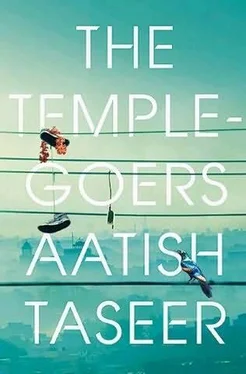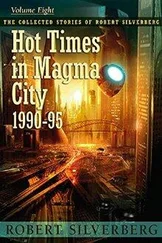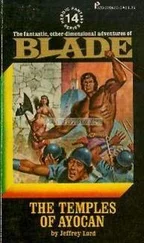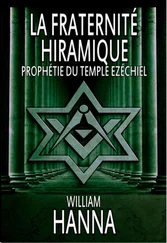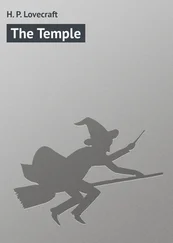‘You’ve come,’ he said.
Then very quickly he was embarrassed. The room I entered had no bed. It was bare except for some light matting, a green metal filing cabinet and shelves in the wall crammed with old editions of the Urdu magazine. The smell of decaying paper filled the little room, with its hanging tube lights and dusty windowpanes; it was hard to believe that the day could ever break here. The telephone lay in one corner on the floor, its wire neatly wrapped many times around it.
Zafar had grown much frailer since the operation. His entire figure was slumped to one side as though it were paralysed. He was thin, unshaven, and the bullet-size sores on his head, still bloody at their hub despite the milder weather, seemed now to hint at a deeper malaise, like mould suggesting damp.
He was also afraid. ‘You shouldn’t have come,’ he muttered as if to himself, and looked blankly at the room.
‘What do you mean? We spoke last night. You told me to come.’
‘I know, I know,’ he said, lowering himself painfully on to a cushion in front of a very small, sloping desk on the floor, ‘but I’ve had news since that there’s going to be a demonstration here today. It might become difficult to get out.’
‘Why didn’t you call?’
‘I only heard once I’d left my house. And the phone here,’ he said, pointing to the green instrument wrapped up in its wire, ‘has been disconnected.’ How he had expected me to call him at all was a mystery; this side of him, his scattiness, was like an aspect of his distress. ‘I know!’ he said with fresh energy. ‘I’ll take you to where I live. We’ll be safe there; it’ll be calm there. We’ll be able to have breakfast in peace. Why don’t you sit down here for a few minutes? I don’t have anything to offer you,’ he said, looking desolately again round the room. ‘Sit, sit, sit,’ he added, hurriedly rising, then wincing with pain. ‘I’ll get dressed and then we’ll go.’
His nervous energy, now subdued, now excited, unsettled me. Zafar gathered a bar of green soap and a towel from a shelf and went quickly down the stairs. I sat with a cushion behind my back and looked through the papers on his desk. They were colourful sketches of geometric shapes, a circle, a right-angle triangle, a rhombus. From where I sat, I could see the street below and a few minutes later I saw Zafar squatting next to a blue bucket in an open cemented area, pouring water over himself. He wore baggy white underwear of sorts, and in his present posture, his long, stringy body seemed like a child’s. Then standing in a towel, he chewed on a neem twig as he shaved, facing a red plastic mirror. It was cracked in the corner and a bit of brown board showed through. When I looked again, an elegant figure in a black, knee-length coat and tight, white trousers swept across the street and climbed the stairs.
‘You’re looking very stylish,’ I said when he appeared in the doorway.
He laughed throatily. ‘I’m wearing it because you’ve come,’ he added, running the back of his hand down the length of the black coat, ‘otherwise, what need is there?’
‘And what are these?’
‘Now that I’m no longer a camel, I’ve become a children’s entertainer. They’re going to use my sketches of shapes in a children’s geometry textbook.’
‘Really?’
‘Really,’ he said, lighting a Win cigarette. ‘One has to do many things. But come on, it’s getting late.’
I was in the street, waiting for Zafar, when a bicycle cart covered in a blue tarpaulin came down the narrow street, leaving a trail of red liquid behind it. Its appearance made the cats spring out from their hiding places under the teashop’s benches. Like little detectives, they inspected the red liquid and began delicately to lick it. The bicycle cart stopped and the driver threw off his tarpaulin to reveal a cart-load of bleeding buffalo parts. There were shanks, thighs with the hoofs and coat still on, and whole horned heads, with blank, skyward-turned eyes. Their black coat against the pink flesh, the rainy sky reflected in their glassy eyes, made a strong and gruesome impression. In the meantime, a butcher in a glass-fronted shop, which said ‘Halal’ in red letters, had begun, bare-chested, to chop up the fresh meat. A dozen riveted cats watched him and in seconds it became apparent why. He appeared in the shop’s raised doorway, wearing only a checked loincloth, and threw handfuls of neatly chopped blackish-pink liver into the street. The cats, with their long, sharp teeth exposed, tore at the small, square pieces. What had earlier been feline poise quickly became a watchful vigilance for competing predators.
Zafar appeared at my side; and as if this dawn carnage was the very thing he had wished to protect me from, he put his arm in mine and we withdrew. We walked to the periphery of the old city, literally to beyond its walls, as though re-enacting some medieval flight from a besieged city.
Half the old city lay between the colonnaded street and the art-deco cinema near where Zafar lived. We started out in a cycle rickshaw, but no sooner had the driver wiped its red leather seat, wet from the light drizzle that fell softly around us, than cries from the demonstration began. They reached us like an echo from within the city. The rickshaw driver looked unsurely back at us. ‘Come on, come on,’ Zafar yelled, in a voice I would not have thought him capable of. The driver put all his weight on the raised pedal and the rickshaw began to move.
Although its rhythmic footfall, its gathering momentum, the faint music of its chanting and slogans condemning police encounters and the killing of innocent Muslims stayed with us the whole time, we never saw the demonstration. It felt as though we circled a stadium or a bullring from which every now and then a column of terrified spectators came rushing out, followed by policemen in olive-green uniforms, beating them with batons. After the bestial display of cats devouring the liver, squatting on the ground, eating of it, with a furtive air about them, almost mistakable for guilt, there was something hollow and airy in these casual acts of violence.
But the rickshaw driver was unnerved; he kept telling Zafar that we couldn’t go any further. It seemed like a strange thing to say, as the streets and wide main roads surrounding the old city were relatively empty, and except for a police presence, there was little preventing us from going on. But the ease of our progress, free of the old city’s daily commotion, with no other rickshaws around, was exactly what worried the driver. When we came at last to yellow metal barricades, an expression of relief passed over his small, dark face.
‘Now it’s clear,’ he said, ‘we can’t go any further.’ As long as we had been in the rickshaw, above the ground and in motion, we had felt secure. To now suddenly be deposited on the empty stretch of road, with the option neither to go forward nor to go back, was to feel that we had fallen into a trap. It was as if this sudden exposure, where a singing bullet might fly out of some unseen sandbag, was to be feared more than angry mobs and baton-wielding policemen.
One policeman, seeing a perhaps unlikely pair huddled near the barricade, approached with long strides. He was tall and attractive with pale, wheat-coloured skin, a thick dark moustache and a prominent mole on his cheek. He swung a stick in one hand as he walked, while the other, in his pocket, dug conspicuously at his balls. He had perfected an expression of bored cruelty; his eyes seemed to search only for prurient excitement. They glazed over when Zafar made his simple request to be allowed past the barricade so that he could go home.
‘Who’s this?’ he said, pointing at me with his stick, but addressing Zafar.
Читать дальше
